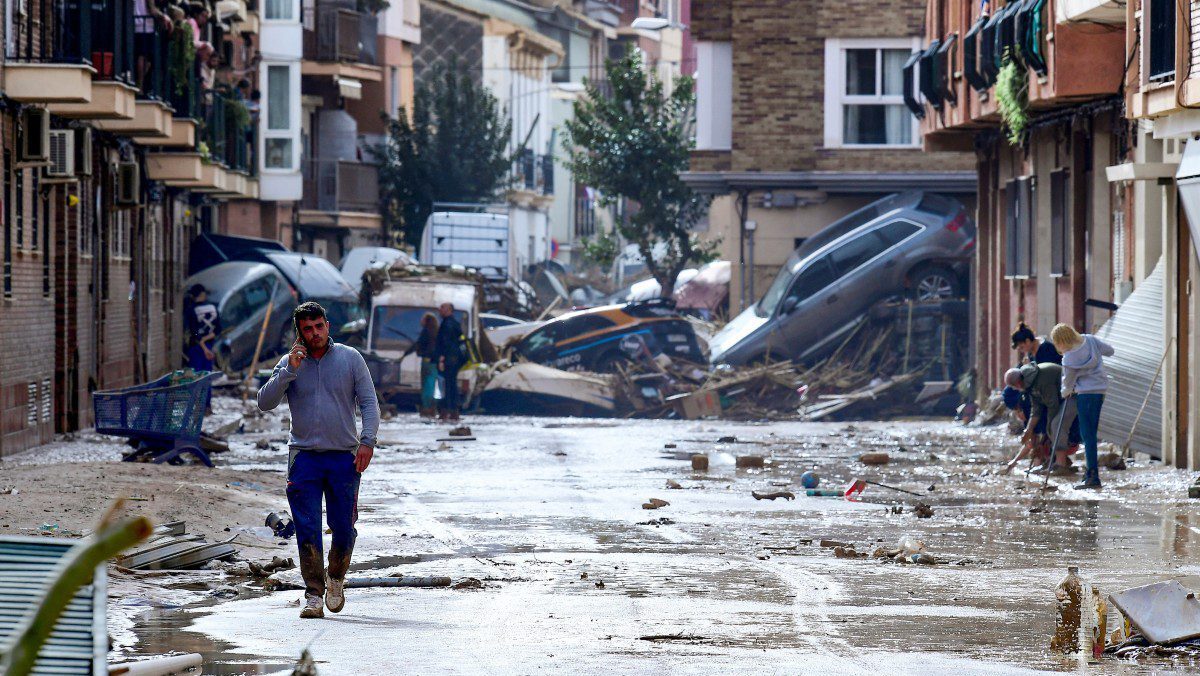
Residents are pictured next to cars piled in a street covered in mud following floods in Picanya, near Valencia, eastern Spain, on October 30, 2024. Floods triggered by torrential rains in Spain’s eastern Valencia region has left 51 people dead, rescue services said on October 30.
Photo: Jose Jordan / AFP
Spain is grappling with an unprecedented natural disaster after flash floods triggered by a DANA storm swept across the country, particularly affecting the Valencia, Andalusia, and Castilla-La Mancha regions.
Official counts report at least 64 fatalities, with many more missing as emergency services battle to access affected areas. The DANA (isolated high-altitude depression) storm has resulted in torrential rains that have battered eastern and southern Spain, unleashing flooding of devastating magnitude that has destroyed communities, derailed a high-speed train, and left thousands stranded without electricity or drinking water.
Many towns in the Valencia region, including Paiporta, Torrent, and Chiva have been among the hardest hit, with Paiporta reporting additional disappearances in the aftermath of an overflowed river. In response, local governments have called for residents to remain indoors and avoid low-lying areas as rain continues and the threat of further flooding persists.
Several accounts have emerged of heroic but ultimately futile efforts to save people caught in the deluge; one particularly tragic incident involved neighbours in Paiporta who attempted to rescue an elderly woman from rising waters, only to watch helplessly as she was swept away.
In scenes reminiscent of disaster movies, videos circulating on social media show streets transformed into rivers, cars overturned or carried off by powerful currents, and residents climbing atop vehicles, homes, and trees to avoid being swept away.
A cold front combined with a saturated atmosphere resulted in more than 300 litres per square metre of rainfall in just eight hours in some areas, according to Aemet, the state meteorological office. Some localities have seen rainfall levels reaching 491 litres per square metre, more than typically seen in an entire year.
The flooding has also created massive disruptions in public infrastructure. High-speed rail connections between Valencia and Madrid remain suspended, while several roads and regional train services are closed indefinitely. In Valencia alone, approximately 155,000 residents have been left without electricity, and many areas remain isolated due to damaged roads.
In addition to immediate rescue operations, forensic specialists have been deployed to assist in the identification of those who have died, and temporary shelters are being established for displaced residents.
Spain’s King Felipe VI extended condolences to the bereaved, describing the events as a tragedy of enormous scale. The king expressed his “grief and concern about the tragedy that has unfolded… especially in Valencia, Castilla-La Mancha, and Andalusia,” adding that he was reassured “to know that all possible means available are at the disposal of the authorities and the emergency services.”
The king said he had been in contact with local leaders, including the prime minister, to coordinate ongoing efforts and monitor developments from a military base in Gran Canaria:
Together with the Queen, we would like to convey our condolences to all the families who have lost loved ones and who, in some cases, still do not know what has happened to their relatives.
PM Pedro Sánchez promised extensive support for rebuilding affected areas, vowing to provide “all the resources of the State and, if necessary, of the EU” to support citizens who have lost their homes, businesses, and even loved ones.
Sánchez further encouraged citizens to remain vigilant, as the disaster is not yet over. “I would like to ask citizens not to let our guard down. The DANA continues to wreak havoc. We cannot consider this episode over yet,” he cautioned, urging people to heed the advice of emergency services to prevent further loss of life.
In response to the crisis, emergency rescue operations have intensified, with military units deployed to assist. Margarita Robles, minister of defence, confirmed that the Spanish Army and Air Force have loaned helicopters for rescue efforts, while the Military Emergency Unit (UME) has dispatched additional personnel trained in flood response. “The Army is ready and fully engaged in ensuring that as many people as possible are reached,” Robles said.
The economic repercussions are expected to be severe, with significant agricultural losses reported in regions such as Utiel-Requena, where local farmers’ associations report extensive damage to crops. Valencian regional president Carlos Mazón explained that access to certain rural communities remains “absolutely impossible,” but efforts to assist these areas continue despite difficult conditions.
Spain, a country recently emerging from a drought crisis, now finds itself struggling with the converse: overwhelming floods. As emergency services work tirelessly to reach the remaining stranded, Spain’s leaders continue to provide assurances that every available resource will be mobilised to alleviate the devastation.
